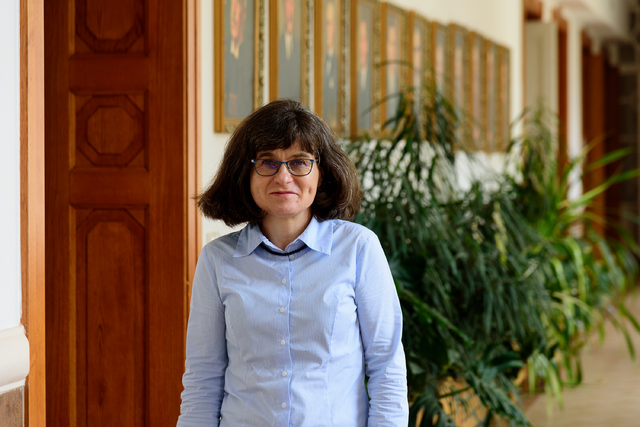Interview with Dr. Kinga Kerekes

Dr. Kinga Kerekes, Associate Professor at Babeş-Bolyai University visited the KTK.
The relationship between the Hungarian Department of the Faculty of Economics and Business Administration of PTE and the Hungarian Department of the Faculty of Economics and Business Administration of Babeş-Bolyai University of Sciences has a history of more than 20 years. We asked Associate Professor Dr. Kinga Kerekes, who visited our Faculty within the framework of the Erasmus programme, about their common past and current visit, as well as about the education in Cluj.
What is the relationship between the PTE Faculty of Business and Economics and your institution?
We have a long and very good relationship, and 20 years ago our colleagues in Pécs helped us a lot in the start of our Hungarian-language training. Mária Vincze, who had many contacts with Pécs, including Professor Bélyácz, but I wouldn't list all the names, because I would certainly leave someone out. Over the past 20 years, many teachers from Pécs have come to Cluj-Napoca to help out, initially teaching full courses, but since then they have been involved as guest teachers and there are also various exchange programmes. We have colleagues who did their doctorate here in Pécs.
I came here for the first time in 2005 as a Phd student, and I have been coming back ever since. I am also a member of the editorial board of the journal Tourism and Rural Development Studies, which is also edited here at the Faculty of Pécs.
What brings you to Pécs now?
I came here with a double purpose, the Erasmus programme gives us the opportunity not only to visit other universities as lecturers, but also to exchange experiences and learn methodologies in the framework of the staff training programme. So now I am not here to teach, but rather to gain experience in teaching methodology, event organisation, research, and to build and deepen contacts. I am staying for one week at the University of Pécs, where I am invited by the Institute of Leadership and Organisation. The timing was influenced by the Ferenc Farkas International Scientific Conference, which I will be attending as a speaker this weekend - another purpose of my trip. I knew Professor Ferenc Farkas personally and have attended all the conferences organised in his honour so far.
What subjects do you teach and what is your narrow field of specialisation in Cluj?
I teach human resource management and project management at both undergraduate and master's level. I also have an interest in rural development, but this is not my main field at the moment. In addition to my teaching work, I am also the editor-in-chief of the journal Economist Forum.
What is your experience of the Faculty of Pécs?
I have always found that the Faculty and the lecturers I know take themselves very seriously. Everyone performs to a very high standard, both in research and teaching. We have learned a lot from each other, and I hope that we can now pass on our experience, as we are perhaps no longer in our infancy. The people of Pécs are very open and willing to share their experiences with us.
Is there a theme in Pécs that you can particularly relate to, an area that this week is particularly about?
We are participating in a human resources research project with the University of Pécs, as we are members of the CRANET international research network. We have worked together with Gábor Balogh and Mártoné Karolinyi on several occasions, and we have also published jointly.
An interesting initiative is the World Hungarian Centre, which is led by Ákos Jarjabka and we are tangentially connected to it, as we are also part of the World Hungarian Centre. For me it is interesting that the university is also open towards civil society.
I also attended a lecture by Ronald Tuninga, who spoke about the accreditation process of the AACSB organisation, which seems to be an interesting opportunity for our Faculty.
What is the current state of economics education in Cluj-Napoca?
We are doing quite well, the economics courses are very popular in all the languages that the university offers. There are more than 700 students in the Hungarian section of the undergraduate programme, 160 students in the Master's programme and 60 students in distance learning. In the bachelor's degree we have four majors - business informatics, management, marketing, finance and banking - and in the master's degree we have digital marketing, business and financial data and data-driven management, so in the master's degree we add a little bit of information technology to the bachelor's degree.
Is the Hungarian course completely separate?
Not legally, but there is a separate Hungarian institute that runs the Hungarian language courses. Curriculum development is relatively autonomous, but our bachelor courses are replicas of the Romanian courses, and we don't differ much in terms of curriculum. Besides Hungarian and Romanian, the Faculty also offers courses in English, German and French. Romanian, Hungarian and German are a continuation of the Transylvanian tradition, while English and French are the Faculty's explicit international orientation.
What is the national and international perception of Babeş-Bolyai University?
In Romania, Babeş-Bolyai University is the highest ranked university and we are also the leader among Romanian universities in international rankings. We also have a leading position in economic education. Our rector and dean are very active in international cooperation, so we are part of several international networks. Our degrees are recognised in quite a few countries.
